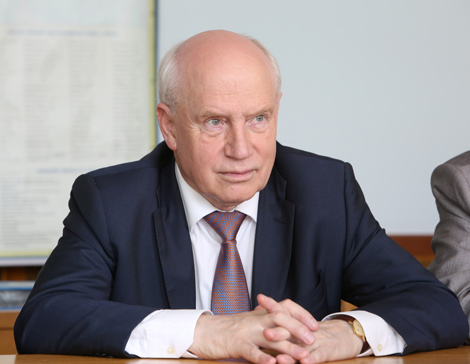Business news
Lebedev: CIS members seek to improve the free trade mechanism
 MINSK, 19 September (BelTA) – The states parties to the CIS Free Trade Agreement are interested in developing it, Chairman of the CIS Executive Committee - CIS Executive Secretary Sergei Lebedev told the media before the session of the CIS Plenipotentiaries Council on 19 September, BelTA has learned.
MINSK, 19 September (BelTA) – The states parties to the CIS Free Trade Agreement are interested in developing it, Chairman of the CIS Executive Committee - CIS Executive Secretary Sergei Lebedev told the media before the session of the CIS Plenipotentiaries Council on 19 September, BelTA has learned.
Sergei Lebedev pointed out that the plenipotentiaries plan to discuss the progress in the FTA’s implementation in 2016-2017. “This is an essential document adopted by the heads of state in 2011,” he specified.
“The most important thing is that each of the nine states parties is keen to implement and improve the agreement. This work will continue,” Sergei Levedev remarked.
In his words, the FTA has come into force, in general. However, the states parties have been implementing its provisions quite slowly. “They comply with the main provisions, although some problems occur from time to time with the movement of goods and trade relations. These problems are related to protection measures in several states, which sometimes are caused by objective reasons,” Sergei Lebedev said. He also reaffirmed that the CIS bodies aim to solve all the problems promptly and effectively, taking into account the interests of every state party to the Free Trade Agreement.
Signed on 18 October 2011, the document is based on the principles and agreements of the World Trade Organization and is meant to ensure free trade between the states parties. In 2016-2017, several documents were adopted defining the requirements and regulation procedures for public procurement, the remuneration for the members and the chairman of the expert commission, and the compensation for their expenses.
According to the press service of the CIS Executive Committee, a number of CIS member states have abolished some restricting tariff quotas and import duties in accordance with the agreement. They have decreased the use of special protection, antidumping, and compensation measures in mutual trade, reduced some export duties, and taken steps to observe the national treatment principle and facilitate payments in mutual trade.







 print version
print version make home page
make home page add to bookmarks
add to bookmarks

